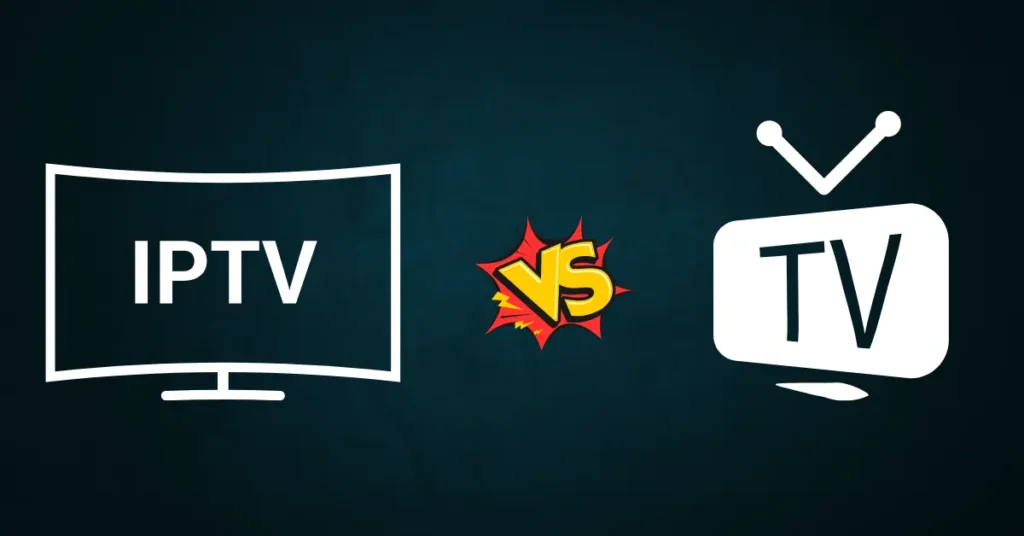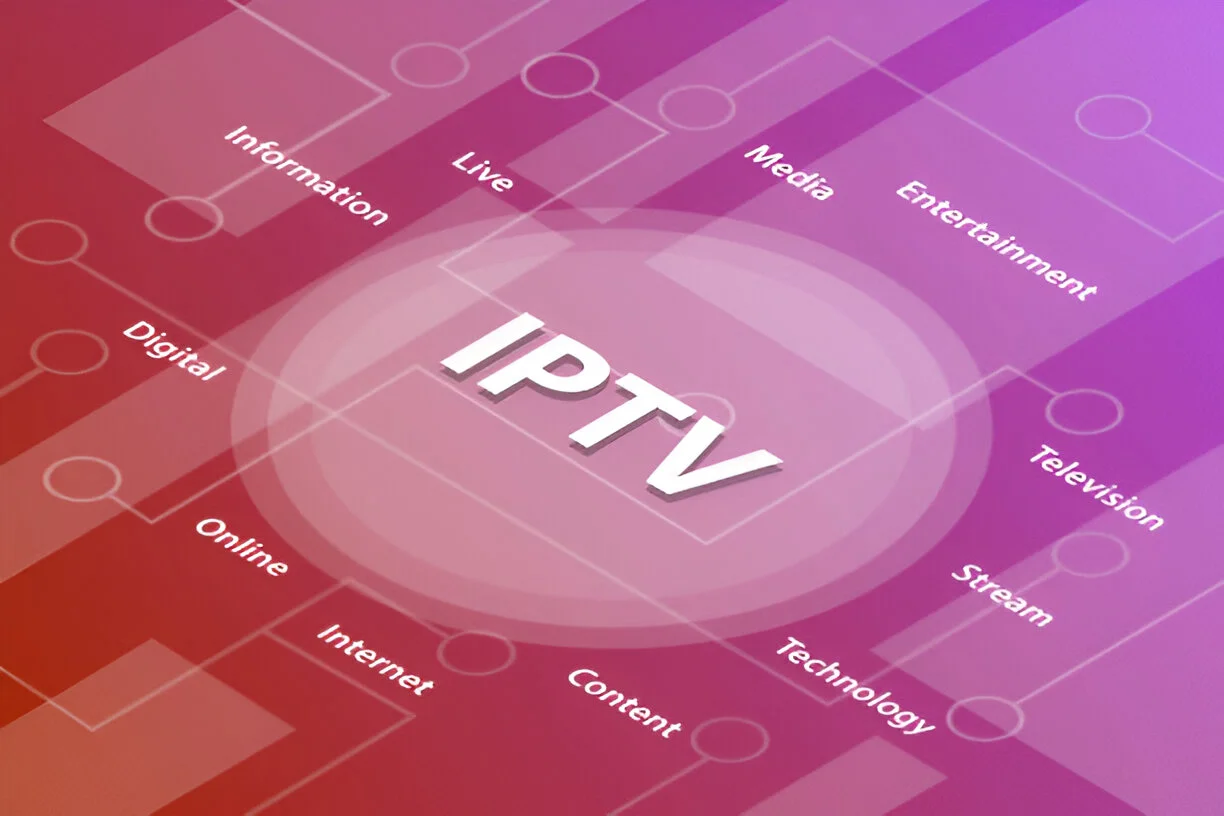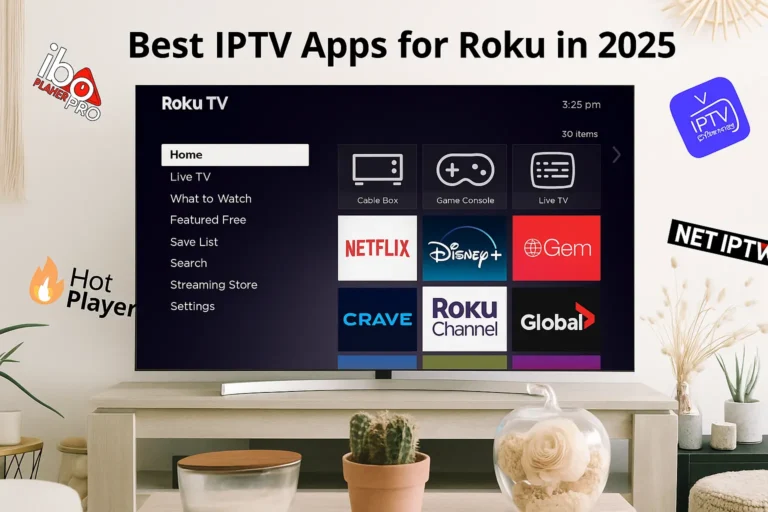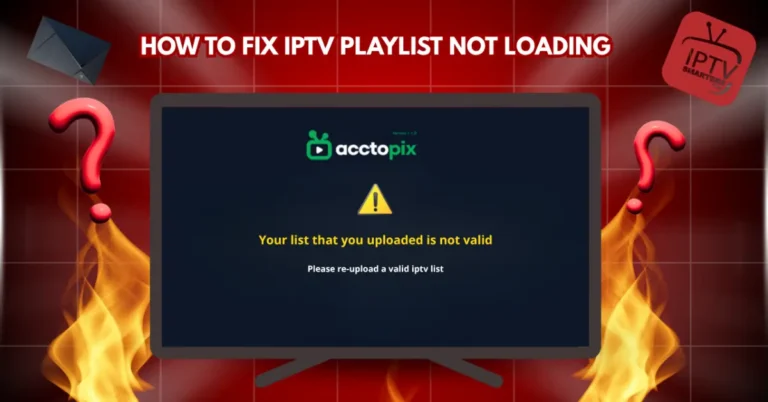A complete guide explaining IPTV technology, how it works, and why it’s revolutionizing the way we consume television content in 2025.
Table of Contents
- What is IPTV?
- How Does IPTV Work?
- Types of IPTV Services
- IPTV vs Traditional TV: Key Differences
- Advantages of IPTV Technology
- IPTV Setup Requirements
- Legal IPTV Services vs Illegal Options
- Market Trends and Future of IPTV
- Frequently Asked Questions
- Conclusion
What is IPTV?
IPTV stands for Internet Protocol Television—a technology that delivers television programming and video content through internet connections rather than traditional broadcast methods like cable, satellite, or terrestrial signals.
Internet Protocol Television (IPTV) is a service that provides television programming and other video content using the Transmission Control Protocol/Internet Protocol (TCP/IP) suite, as opposed to broadcast TV, cable TV or satellite signals. Unlike traditional television broadcasting that sends all content simultaneously to every viewer, IPTV sends only one program at a time in a unicast format, with content remaining on the internet service provider’s network.
The technology has transformed how we consume entertainment, offering unprecedented flexibility and control over viewing experiences. From live sports to on-demand movies, IPTV enables users to access content across multiple devices with just an internet connection.
Key Characteristics of IPTV:
- Internet-based delivery: Content streams through broadband connections
- On-demand accessibility: Watch content when you want, not when it’s scheduled
- Multi-device compatibility: Stream on TVs, smartphones, tablets, and computers
- Interactive features: Pause, rewind, and fast-forward live broadcasts
- Global reach: Access international content from anywhere
How Does IPTV Work?
Understanding IPTV’s technical foundation helps appreciate its advantages over conventional television systems. The technology relies on packet-based data transmission over IP networks, fundamentally different from traditional broadcasting methods.
The IPTV Architecture
Content Sources and Encoding IPTV relies on several key components to function effectively, requiring access to various content sources like live TV channels and on-demand videos, with encoding systems converting this content into compressed data.
Server Infrastructure IPTV services run all their channels on central servers and broadcast them individually to viewers using unicasting technology, which requires significantly less signal bandwidth than the multicasting of traditional television broadcasting.
Content Delivery Network To reach a global audience, the central server for an IPTV service transmits its channels to several regional offices worldwide, ensuring viewers don’t have to wait for requests to travel long distances.
Technical Protocols Used
| Protocol | Purpose | Usage |
|---|---|---|
| IP Multicasting | Live TV broadcasts | Efficiently delivers live content to multiple viewers |
| RTSP (Real-Time Streaming Protocol) | On-demand content | Manages video streaming sessions |
| HTTP | Video-on-demand | Downloads and buffers complete video files |
| IGMP (Internet Group Management Protocol) | IPv4 networks | Manages multicast group memberships |
Step-by-Step IPTV Process:
- Content Acquisition: Providers collect content from various sources (live broadcasts, studios, archives)
- Encoding and Compression: Raw content is converted into digital formats suitable for internet transmission
- Storage and Management: Content is stored on servers and organized for easy access
- Transmission: Content streams to users through IP networks using appropriate protocols
- Decoding: User devices receive and decode the data into viewable video content
Types of IPTV Services
IPTV technology supports three primary content delivery formats, each serving different viewing preferences and requirements.
1. Live Television (Real-Time Broadcasting)
Live IPTV streams television content in real-time, similar to traditional TV but with enhanced flexibility. Unlike traditional TV, live IPTV channels allow viewers to watch from anywhere, as long as they have internet access—users may even pause or rewind live broadcasts.
Examples of Live IPTV Services:
- Hulu + Live TV
- YouTube TV
- Sling TV
- FuboTV
2. Video-on-Demand (VOD)
Video on Demand (VOD) is the most complete format of IPTV, offering Netflix-style streaming with access to content ranging from a few hours to years old, providing limitless accessibility and higher-quality streaming.
Key Features:
- Extensive content libraries
- Watch anytime convenience
- Adaptive bitrate streaming
- Multiple quality options
3. Time-Shifted Television
Time-shifted TV allows viewers to watch previously aired content within a specific timeframe, typically 24-72 hours after original broadcast.
Benefits:
- Rewatch content you’ve missed or forgot to record through catch-up TV, rewind to the start of broadcasts, and pause live content before resuming
- No storage requirements on user devices
- Automatic content availability
- Seamless integration with live TV
Comparison of IPTV Service Types
| Service Type | Content Availability | Interaction Level | Bandwidth Requirements |
|---|---|---|---|
| Live TV | Real-time only | Medium (pause, rewind) | Consistent, moderate |
| VOD | Extensive library | High (full control) | Variable, adaptive |
| Time-Shifted | Recent broadcasts | Medium | Moderate |

IPTV vs Traditional TV: Key Differences
The fundamental differences between IPTV and traditional television extend beyond simple delivery methods, affecting user experience, content accessibility, and cost structures.
Technical Delivery Comparison
| Aspect | Traditional TV | IPTV |
|---|---|---|
| Signal Delivery | Cable/Satellite/Antenna | Internet Protocol Networks |
| Content Distribution | Multicast (all channels simultaneously) | Unicast (selected content only) |
| Bandwidth Usage | Fixed, regardless of viewing | Dynamic, based on consumption |
| Quality Control | Provider-managed infrastructure | Internet connection dependent |
| Geographic Limitations | Regional broadcasting zones | Global accessibility |
User Experience Differences
Traditional TV Limitations:
- Fixed programming schedules
- Limited channel packages
- Expensive equipment rentals
- Geographic content restrictions
- No portable viewing options
IPTV Advantages:
- On-demand scheduling
- Customizable channel selections
- Device flexibility
- International content access
- Portable entertainment solutions
Cost Analysis
IPTV services are widely recognized as more affordable than traditional cable TV, with providers offering subscription options ranging from monthly to lifetime plans at reasonable prices.
Traditional TV Costs:
- High monthly subscription fees
- Equipment rental charges
- Installation and maintenance fees
- Premium channel add-ons
- Contract obligations
IPTV Cost Benefits:
- Lower monthly subscriptions
- No equipment rental fees
- Flexible payment options
- Bundle possibilities
- Trial periods available
Ready to Experience Premium IPTV? ACCTOPIX offers over 30,000 premium channels plus extensive movie and series libraries. Start your free trial today and discover the difference quality IPTV makes.
Advantages of IPTV Technology
IPTV’s technological foundation provides numerous benefits that traditional broadcasting methods cannot match, making it an increasingly popular choice for content consumption.
Superior Content Quality and Features
Enhanced Video Quality IPTV delivers higher resolutions, such as 4K and HDR, than traditional television, with 5G networks enabling streaming of 4K and even 8K content with unparalleled fluidity.
Advanced Streaming Technologies:
- Adaptive bitrate streaming for optimal quality
- Multiple resolution options (SD, HD, 4K, 8K)
- Surround sound capabilities
- HDR content support
Flexibility and Convenience
Multi-Device Accessibility Most IPTV services are compatible with all devices, even mobile phones, allowing users to watch favorite content from anywhere in the world with just a stable internet connection.
Supported Devices:
- Smart TVs
- Smartphones and tablets
- Computers and laptops
- Gaming consoles
- Streaming devices (Fire Stick, Roku, Apple TV)
- Set-top boxes
Global Content Access
IPTV breaks down geographical barriers, providing access to international programming that traditional TV cannot offer.
International Benefits:
- Access to global news sources
- International sports coverage
- Foreign language programming
- Cultural content diversity
- Expatriate entertainment solutions
Economic Advantages
Cost-Effective Entertainment The IPTV model offers significant savings compared to traditional cable packages while providing more content variety.
Financial Benefits:
- Lower subscription costs
- Elimination of equipment fees
- Flexible payment terms
- No installation charges
- Reduced overall entertainment expenses
Technological Integration
Because IPTV uses a packet-based delivery system, it can be bundled with other IP-based telecommunication services, such as voice over IP and high-speed internet.
Integration Possibilities:
- VoIP telephone services
- High-speed internet packages
- Smart home connectivity
- Cloud storage solutions
- Security systems
IPTV Setup Requirements
Setting up IPTV requires specific equipment and network conditions to ensure optimal viewing experiences. Understanding these requirements helps users prepare for successful IPTV implementation.
Essential Equipment
Internet Connection Requirements A stable and fast internet connection is crucial, as poor connectivity leads to buffering, interruptions, and low-resolution streaming.
Minimum Speed Requirements:
- Standard Definition (SD): 3-5 Mbps
- High Definition (HD): 8-10 Mbps
- 4K Ultra HD: 25-35 Mbps
- Multiple simultaneous streams: Add 5-10 Mbps per additional stream
Device Options
Set-Top Boxes Users need access to software that manages IPTV channels and a set-top box that receives and decodes IP packets to signals TV screens can display.
Popular Set-Top Box Options:
- MAG Boxes (MAG254, MAG322, MAG524)
- Dreamlink T1 Plus
- BuzzTV XRS 4000
- Formuler Z8 Pro
- AVOV TVonline+
Smart TV Integration Alternatively, users can skip the set-top box and use apps on their smart TVs, computers, or mobile devices to stream IPTV content directly.
Network Configuration
Router Specifications
- Dual-band or tri-band capabilities
- Quality of Service (QoS) features
- Gigabit Ethernet ports
- Strong Wi-Fi coverage
- Advanced traffic management
Optimization Tips:
- Use wired connections when possible
- Configure QoS for video traffic priority
- Ensure adequate Wi-Fi coverage
- Monitor bandwidth usage
- Regular router firmware updates
Software Requirements
IPTV Player Applications
| Application | Platform Compatibility | Key Features |
|---|---|---|
| IPTV Smarters Pro | Android, iOS, Windows, macOS | EPG support, VOD, Multi-playlist |
| TiviMate | Android, Android TV | Premium EPG, Recording, Favorites |
| Perfect Player | Android, Windows | Lightweight, Customizable interface |
| GSE Smart IPTV | iOS, Apple TV | Advanced controls, Chromecast support |
| Kodi | Multiple platforms | Open-source, Extensive add-ons |
Legal IPTV Services vs Illegal Options
Understanding the legal landscape of IPTV is crucial for users seeking reliable, safe, and legitimate entertainment solutions. The distinction between legal and illegal services affects quality, reliability, and user safety.
Identifying Legal IPTV Services
Many IPTV services are legal, offering live TV streaming privileges thanks to partnerships with major media companies, with famous legal services including Fubo TV, Sling TV, YouTube TV, Hulu + Live TV, and Philo.
Characteristics of Legal Services:
- Legitimate service providers openly partner and maintain transparency with both authorities and customers, offer dedicated apps, prioritize viewer experience with limited advertising, and may provide additional services like internet
- Proper content licensing agreements
- Official app store availability
- Transparent pricing structures
- Customer support services
- Legal business registration
Popular Legal IPTV Providers
Major Legal Services:
| Service | Monthly Cost | Key Features | Channel Count |
|---|---|---|---|
| YouTube TV | $72.99 | Unlimited DVR, 6 accounts | 100+ channels |
| Hulu + Live TV | $76.99 | Disney+ included, ESPN+ | 95+ channels |
| Sling TV | $40-55 | Customizable packages | 30-50+ channels |
| FuboTV | $74.99 | Sports-focused, 4K content | 190+ channels |
| Philo | $25 | Entertainment-focused | 70+ channels |
Risks of Illegal IPTV Services
Legal Consequences Using unauthorized IPTV services can result in:
- Copyright infringement penalties
- Legal action from content owners
- ISP account termination
- Criminal charges in severe cases
Technical and Security Risks
- Unreliable service quality
- Frequent interruptions
- Malware and security threats
- Data privacy concerns
- No customer support
Quality Issues Illegal service providers often offer services with low prices, hidden payment modes, offshore hosting, recommend using VPNs, and lack transparent partner information.
Making the Right Choice
Due Diligence Checklist:
- Verify business licensing and registration
- Check for transparent pricing and terms
- Confirm official app availability
- Research customer reviews and ratings
- Ensure proper content licensing
- Evaluate customer support quality
Experience Premium Legal IPTV with ACCTOPIX – Our service provides over 30,000 legitimate channels with proper licensing agreements. Try our free trial to experience reliable, high-quality IPTV entertainment.
Market Trends and Future of IPTV
The IPTV industry continues evolving rapidly, driven by technological advancements and changing consumer preferences. Understanding current trends and future developments helps users and providers prepare for upcoming changes.
Current Market Growth
Industry Statistics According to a report published by Acumen Research and Consulting, the Global IPTV Market is steadily growing and will be worth $311.2 billion by the year 2032, with market share expected to rise up to $105.64 billion in 2029 with a CAGR of 18.99%.
Growth Drivers:
- Increasing broadband penetration
- Rising demand for on-demand content
- Cord-cutting from traditional TV
- Mobile device proliferation
- Improved streaming technologies
Technological Advancements in 2025
5G Network Integration The global deployment of 5G networks has become a pivotal enabler for IPTV services, addressing long-standing issues of latency and bandwidth limitations with data transfer speeds exceeding 1 Gbps.
5G Benefits for IPTV:
- Ultra-low latency streaming
- Enhanced mobile IPTV experiences
- Support for 8K content delivery
- Improved rural connectivity
- Better multi-device streaming
Artificial Intelligence Integration AI and Machine Learning are foundational to IPTV evolution, driving hyper-personalization and delivering recommendations based on viewing habits and contextual factors like time of day or device preference.
AI Applications:
- Personalized content recommendations
- Adaptive bitrate optimization
- Predictive content caching
- Automated content categorization
- Enhanced user interface optimization
Emerging Technologies
8K Streaming Revolution Central to the evolving IPTV landscape is the transition to 8K streaming, representing the next leap in visual fidelity and pushing providers to optimize their infrastructure.
Cloud-Native Solutions Cloud has emerged as the backbone of next-generation IPTV solutions, replacing traditional hardware-reliant architectures with scalable, flexible, and cost-effective alternatives.
Future Predictions for IPTV
Technology Integration Trends:
- Augmented Reality (AR) content overlays
- Virtual Reality (VR) immersive experiences
- Internet of Things (IoT) device integration
- Blockchain-based content distribution
- Edge computing for reduced latency
Market Evolution:
- Increased consolidation among providers
- Enhanced international content availability
- Improved content discovery algorithms
- Advanced analytics and viewer insights
- Sustainable streaming practices

Regional Market Development
Global Expansion Patterns:
| Region | Growth Rate | Key Drivers | Market Challenges |
|---|---|---|---|
| North America | 12-15% annually | 5G deployment, cord-cutting | Regulatory compliance |
| Europe | 14-18% annually | GDPR compliance, quality focus | Market fragmentation |
| Asia-Pacific | 20-25% annually | Mobile-first adoption | Infrastructure development |
| Latin America | 16-20% annually | Internet penetration growth | Economic stability |
Frequently Asked Questions
What equipment do I need to start using IPTV?
You need a stable internet connection (minimum 10 Mbps for HD), a compatible device (smart TV, set-top box, smartphone, or computer), and a subscription to a legitimate IPTV service. Alternatively, users can skip the set-top box and use apps on their smart TVs, computers, or mobile devices to stream IPTV content directly.
How much internet speed is required for IPTV?
Internet speed requirements vary by content quality:
- SD content: 3-5 Mbps
- HD content: 8-10 Mbps
- 4K content: 25-35 Mbps
- Multiple streams: Add 5-10 Mbps per additional simultaneous stream
Is IPTV legal to use?
Many IPTV services are legal, offering live TV streaming privileges thanks to partnerships with major media companies. The legality depends on the service provider’s licensing agreements. Always choose reputable providers with proper content licenses.
Can I use IPTV on multiple devices simultaneously?
Most IPTV services support multiple device connections, though the exact number varies by provider. Most IPTV streaming services limit the number of simultaneous broadcasts to a few devices. Check your service’s terms for specific limitations.
What’s the difference between IPTV and regular streaming services like Netflix?
While both deliver content over the internet, IPTV typically includes live TV channels alongside on-demand content, whereas services like Netflix focus primarily on on-demand libraries. IPTV often offers broader channel selections and live programming.
Do I need a VPN for IPTV?
Governments and ISPs across the world monitor their users’ online activities, so if you use third-party IPTV services, you should always use a good IPTV VPN to hide your identity. A VPN is recommended for privacy and to access geo-restricted content.
How reliable is IPTV compared to traditional cable TV?
IPTV reliability depends on your internet connection quality and service provider infrastructure. With a reliable broadband connection like fiber optic cable, IPTV technology offers 4K streaming, surround sound, and high-bitrate content.
Can I record shows with IPTV?
Many IPTV services offer DVR functionality, allowing you to record live content for later viewing. Legal IPTV providers like Hulu + Live TV offer unlimited DVR functionality, storing recorded content for specific periods.
Conclusion
IPTV represents a fundamental shift in how we consume television content, offering unprecedented flexibility, quality, and value compared to traditional broadcasting methods. Internet Protocol TV is television delivered over the internet rather than traditional ways like satellite, cable, or antenna, using Transmission Control Protocol/Internet Protocol (TCP/IP).
The technology’s advantages are compelling: superior content quality with 4K and 8K support, global accessibility, cost-effective pricing, and multi-device compatibility. IPTV delivers higher resolutions than traditional television while offering global reach regardless of location.
As we advance into 2025, 5G deployment, AI-driven personalization, and cloud-native solutions are positioning IPTV to redefine digital entertainment. The market’s projected growth to over $311 billion by 2032 reflects the technology’s increasing adoption and consumer preference.
However, success with IPTV requires careful provider selection, adequate internet infrastructure, and understanding of legal considerations. Choose legitimate services with proper licensing, ensure sufficient bandwidth for your viewing needs, and consider security measures for optimal experiences.
Key Takeaways:
- IPTV offers superior flexibility and quality compared to traditional TV
- Legal services provide reliable, secure entertainment experiences
- Proper setup and internet speeds are essential for optimal performance
- The technology continues evolving with 5G, AI, and cloud innovations
- Market growth indicates IPTV is the future of television entertainment
Whether you’re considering switching from traditional cable or exploring new entertainment options, IPTV provides a compelling solution that adapts to modern viewing preferences while delivering exceptional value and quality.
Suggested Cluster Articles:
- “Best IPTV Providers 2025: Complete Review and Comparison” – Detailed provider analysis with pricing, features, and recommendations
- “IPTV Setup Guide: Complete Installation Tutorial for All Devices” – Step-by-step setup instructions for various platforms and devices
- “Legal vs Illegal IPTV: How to Choose Safe and Reliable Services” – Comprehensive guide on identifying legitimate providers and avoiding risks
- “IPTV Troubleshooting: Common Issues and Solutions“ – Technical support guide for buffering, connection, and quality problems
- “Future of IPTV Technology: 5G, AI, and Next-Generation Features” – Deep dive into emerging trends and technological developments
Disclaimer: This article is for informational purposes only. Readers are advised to verify the legality and legitimacy of any IPTV service before subscribing. Always choose reputable providers with proper content licensing agreements.
Experience Premium IPTV with ACCTOPIX – Join thousands of satisfied customers enjoying over 30,000 premium channels, movies, and series. Start your free trial today and discover why ACCTOPIX is the trusted choice for quality IPTV entertainment.




